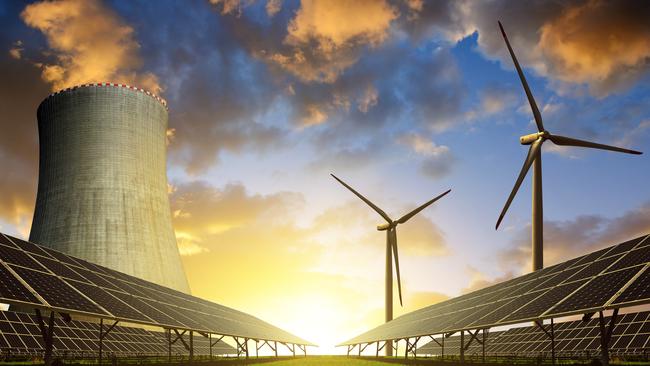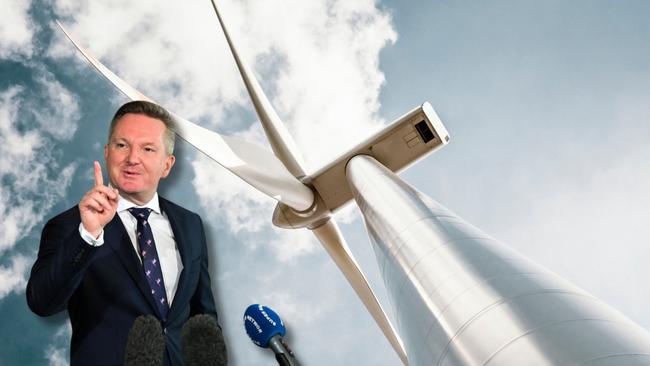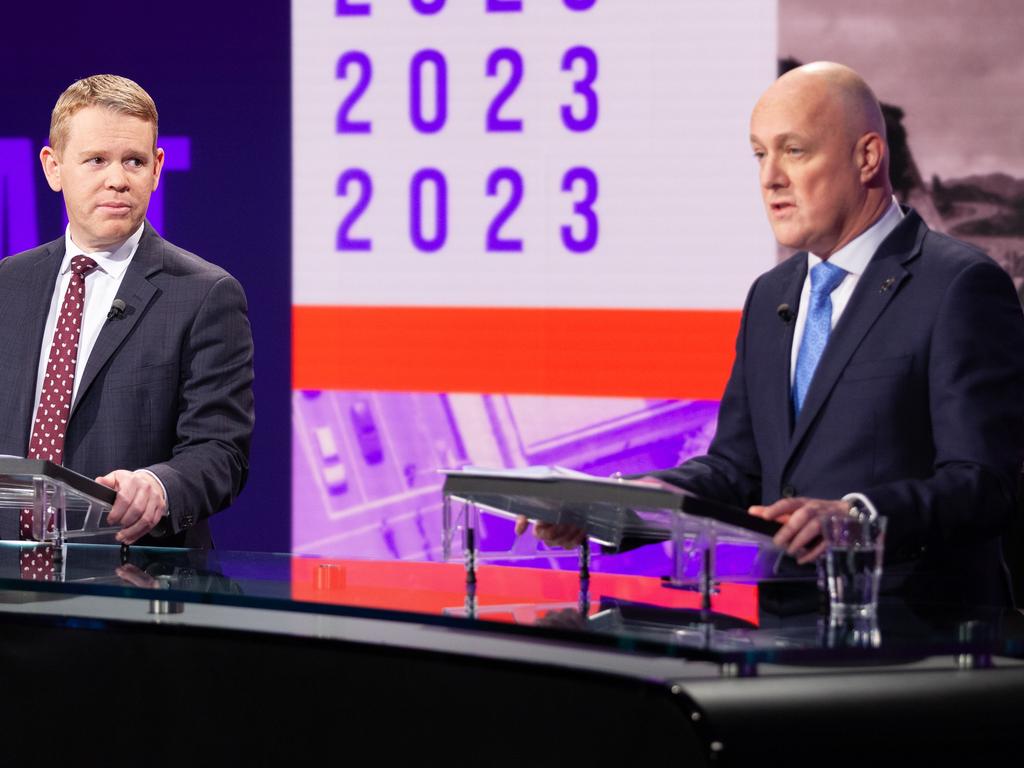Labor launches early strike as Coalition flags nuclear option ahead of next election
Australia is heading towards an extraordinary, intense and unpredictable battle over nuclear power at the federal election.

The pre-emptive strike this week by Climate Change and Energy Minister Chris Bowen with deliberately exaggerated figures on the cost of the Coalition’s undecided nuclear power policy is designed to discredit the nuclear option ahead of its announcement.
Senior Coalition figures are divided on the way forward. But opposition climate change and energy spokesman Ted O’Brien tells Inquirer: “I have come to the conclusion we cannot reach net zero in Australia without next-generation, zero-emissions nuclear energy. We need to learn from other countries that have been decarbonising successfully while maintaining strong economies, and they include substantial amounts of nuclear energy.”
O’Brien has sketched the framework – an energy model “with every option on the table”. That means renewables and nuclear. “We see a role for zero-emissions nuclear energy as part of a balanced mix for Australia’s future grid,” he says.
The Coalition shadow cabinet will soon face a moment of truth on the nuclear issue. The Liberals and Nationals know public opinion is shifting. Realism is invading the debate. People are grasping how hard net zero is as a goal. They sense it is irrational to say nuclear is illegal. Yet the risks are real and an anti-nuclear political scare would have traction.
Yet the Opposition Leader’s remarks point to a potentially audacious move to change the dynamics of the climate debate by backing, in one form or another, the nuclear option. A new energy policy conflict with a different twist is coming. This week Dutton repeated his foundational assessment: “I don’t believe for a moment that Labor can get to zero emissions by 2050 with their current energy mix. There’s no way in the world.”
The Coalition is convinced Bowen’s renewables rollout will fail – in delivery and in the politics. Dutton’s central propositions, now mounted for some time, are that Bowen’s 82 per cent renewable commitment at 2030 is over-reach, a flawed policy, won’t deliver lower consumer prices while it will ignite a grassroots backlash across many communities where farmers, environmentalists, the tourist industry, fishers and local residents and industry are launching protest movements.
There are multiple political risks for both sides. A reality of climate politics is going to be reinforced – the issue cuts different ways in different parts of the country. The credibility of Bowen’s campaign against nuclear is tied to the credibility of his renewables rollout.
But the credibility of any Coalition pledge on nuclear is tied to the ultimate question: does nuclear power work as a market-based economic proposition for Australia – with Bowen and O’Brien in fierce dispute on that question.
A searing truth for the Liberals and Nationals is that nuclear cannot be reduced to a convenient political tactic. The Coalition must be serious – if it commits, that’s a historic promise for a civil nuclear industry for Australia.
Bowen flatly tells Inquirer: “This policy will not survive contact with reality.” Might Bowen intimidate the Coalition into mere nuclear tokenism?
This week’s costings venture by Bowen was aimed at flushing out the Liberals. They are talking the big talk; will they walk the big walk? Bowen wants to impose a price on Dutton’s endless pro-nuclear conversation. Bowen’s claim that Australians will be lumped with a $387bn nuclear cost burden is fantasy because it assumes retiring coal-fired power will be replaced entirely by nuclear, with 71 small modular reactors required, given the Coalition has yet to announce its policy and that proposition would be improbable. What counts for Bowen is not the number but the argument: while opinion is divided there is much economic analysis that nuclear is unlikely to be viable in cost terms.

Bowen taunts Dutton: “If it’s so easy, Mr Dutton, where is your plan?” Bowen draws a line in the sand. “I can’t think of a worst fit for Australia’s energy needs than nuclear power.” He damns nuclear as too costly, too slow to build and generating too much waste.
Watching this conflict, you sense both sides have gone too far to back off.
The nuclear debate comes with a long-term security dimension. Bipartisanship on AUKUS could be jeopardised. O’Brien tells Inquirer: “I do not believe AUKUS can be successful in Australia without a civil nuclear industry due to the lessons learn from the other nuclear submarine powers.”
This is a policy reversal from the foundation on which Scott Morrison achieved Australian bipartisanship. Morrison proceeded with AUKUS only when advised it was achievable without a civil nuclear industry. He knew this was a non-negotiable condition for Labor. Morrison would not have promoted AUKUS if advised a local nuclear industry was essential – yet this is exactly what O’Brien is now saying.
Interviewed by this paper, Bowen branded this “an extraordinary backflip”.
If the Coalition proceeds with the nuclear power option, it will be tempted to commit to this position – creating a nexus between AUKUS and a local nuclear industry. That might help the Coalition politically. But it would render serious early damage to AUKUS. It would inject a fundamental Liberal-Labor conflict into the domestic foundations of the basis on which Australia planned to develop and build nuclear-powered submarines. In the current situation, domestic bipartisanship remains essential.
The Labor Party, given its internal politics, cannot shift to accept nuclear power. Labor, therefore, is vulnerable in seeking to retain the legislative ban on nuclear power. Such a discriminatory ban on a single energy source, accepted by much of the world, is absurd and irrational.
Bowen dismisses the issue saying it is a “massive distraction”. But it’s not. Presumably, most Australians would prefer the ban lifted so nuclear could be assessed in the marketplace. Yet the issue of the ban is also a trap. The Coalition can’t just pledge to lift the ban, full stop. That’s like driving to the beach but not entering the water. Coalition voters would interpret such a position as craven weakness. Sure, Labor would lose any debate about the ban but Dutton wouldn’t be the winner “if that’s all there was”. The issue for the Coalition is how far it goes down the nuclear path.
O’Brien floats the idea of a selective easing of the moratorium, perhaps opening the way for the small modular reactors. But most Coalition voters want tangible action – that means an agenda eventually leading to civil nuclear power. The framework for this is vital: it only works with the Coalition sticking by Morrison’s hard-won net zero by 2050 policy.
Walking away from this framework would constitute the kiss of political death. That’s because Dutton needs net zero to show he’s serious about climate action. Ditch that and the Coalition is fully exposed to a political onslaught from Labor, Greens and teals that it is turning the clock back beyond Morrison in climate denialism.
O’Brien makes this clear: the new political strategy is that the Coalition believes in emissions reduction and believes in being energy agnostic.
For Dutton, the embrace of nuclear would serve two purposes: to prove the Coalition is proactive on the clean energy action and to expose Labor as ideological zealots, set on a renewables rollout, already behind schedule, that is too ambitious, too costly and too disruptive. Dutton attacks Bowen for an “unhinged” obsession with renewables.
The more trouble Bowen faces with his renewables rollout, the more confident Dutton sounds on nuclear. On July 7 Dutton delivered a remarkably expansive speech to the Institute of Public Affairs. He invoked a global momentum for nuclear, saying “the new nuclear technology train is pulling out of the station” and “Australia needs to jump aboard”. Sounds pretty clear.
Dutton called on the government to “swiftly” alter the legislative prohibitions. He said he stood for decarbonisation based on cheaper, more reliant, lower-emission electricity – but the Albanese government was obsessed with a “renewables-only mentality”, that it spurned being “technologically agnostic” and its renewables ideology was imposing higher prices on Australia.
“Australians must consider new nuclear technologies as part of the energy mix,” Dutton said. “Now, if the government wants to stop coal-fired power and phase out gas-fired power, the only feasible and proven technology which can firm up renewables and help us achieve the goals of clean, cost-effective and consistent power is next-generation nuclear technologies, which are safe and emit zero emissions, namely small modular reactors, or SMRs, and microreactors.
“We could convert or repurpose coal-fired plants to use the transmission connections which already exist on those sites and it’s no wonder that more than 50 countries are exploring or investing in new SMRs and nuclear batteries. Nuclear is the only proven scalable zero-emission energy source which is not weather dependent.”
Dutton pointed to nuclear developments in the US, Canada, Britain, France, Sweden, Germany and South Korea to argue that Australia was being left behind. He asked: “If nuclear power is so prohibitively expensive, why are more than 50 countries investing in it?” The opposition believes public opinion is turning more towards nuclear, notably in the regions and among young people.
Dutton’s speech was an important factor in Bowen’s decision to take the offensive. Bowen’s calculations drew on GenCost, a collaboration between the CSIRO and the Australian Energy Market Operator, with the core conclusion being that nuclear energy is around three times more expensive than firmed renewables.
The GenCost costing methodology has been called into question previously and Grattan Institute energy director Tony Wood criticised the reliability of the costings Bowen produced this week. Yet the Coalition lacked the basis for an effective reply on costings since it has produced no policy.
“Every time you look at Mr Dutton and Mr O’Brien, they’re talking about nuclear,” Bowen said. “Well, it’s time to put some meat on the bone. If Mr Dutton and Mr O’Brien are serious, they will respond with their costings and they will tell the truth to the Australian people.”
Bowen said the Liberals criticised Labor for being too focused on renewables, given its 82 per cent renewables target at 2030, but timing constraints meant nuclear could play no role in achieving Australia’s 2030 targets. Bowen said 2029 and 2030 were the “most optimistic” forecast for SMRs in the US and Canada, and any timetable for Australia would be far into the 2030s.
Interviewed by Inquirer, O’Brien agrees any Coalition nuclear policy would apply only post-2030. This means a Coalition pledge to nuclear cannot have any practical impact for the next two parliamentary terms beyond the current term. In that sense Coalition claims that nuclear could complement renewables in the pursuit of the 2030s targets have no substance.
The upshot is that Australia faces a certain and contentious debate over the cost of nuclear. Yet that debate will be far removed from the tangible reality of the 2030 targets.
“Our plan for 2030 is for 82 per cent renewables but that leaves 18 per cent for a role for fossil fuels,” Bowen said. “And as coal leaves the system that 18 per cent will increasing be gas.” But while Bowen supports gas as a transition fuel he thinks there is no need for new gas-fired power stations.
In recent months warnings have intensified about the renewables rollout. AEMO head Daniel Westerman says investment in new, clean energy is not moving fast enough to replace closing coal-fired power stations and that more priority must be paid to “firming” technologies. State governments are moving to prolong the life of coal power. The risk is that fossil fuel power is being shut before viable alternatives are ready. Meanwhile, consumer prices continue to rise.
Bowen concedes the problems. Pressed this week by the ABC, he said: “It’s a big job, our plans are ambitious, we’ve always said that. Now I would characterise it as saying we are doing well, but I want to do better.” He said the 82 per cent target was “absolutely essential”. Yet the problems surrounding rewiring the nation, clean energy investment and regulatory approvals are now compounded by a growing political backlash.
O’Brien says: “Labor’s radical experiment of an electricity grid built almost entirely on wind and solar defies economics and engineering, and the scale and speed of its proposed rollout is unprecedented: 22,000 solar panels installed every day and 40 wind turbines every month until 2030, along with tens of thousands of kilometres of transmission lines.”
But the Coalition is guaranteed to face thorny challenges over the cost of nuclear. In July a report from Net Zero Australia – a partnership among the University of Queensland, the University of Melbourne, Princeton University and Nous Group – assessed modelling options on the best path to net zero at 2050. On the specific direction in which the Liberals are heading – scaling back renewables for nuclear – the report is specific.
“To reduce renewable targets in the belief that nuclear will be deployed later at scale would create a material risk of not achieving net zero, or doing so at an excessive cost,” the report says. “Nuclear should not be regarded as an alternative to renewables but the option could be monitored as a hedge against the risks of the transition.”
The report says in the modelling “most favourable to nuclear deployment” (a constrained renewable build rate and low nuclear costs) nuclear produces only a small proportion, about 4 per cent, of Australia’s energy at 2050.
It says Australia’s lack of expertise and experience likely would contribute to long lead times for nuclear. In looking at “what must happen by 2030” the report concludes: “We should proceed on the basis of no nuclear contribution.” This sounds like Bowen.








Australia is heading towards an extraordinary, intense and unpredictable battle over nuclear power at the federal election – the next stage in our permanent climate change political war – with Peter Dutton determined to transform the terms of the climate debate.